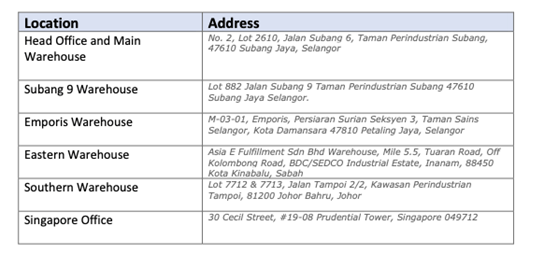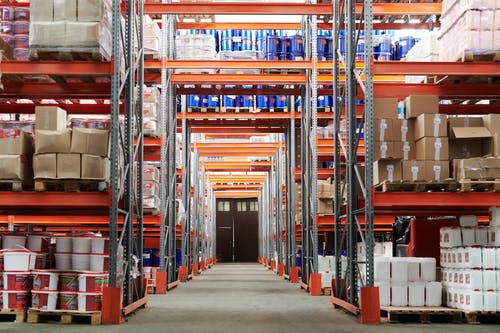
4 Types of Storage Space For Rent In Malaysia
There are 4 types of storage space for rent in Malaysia one should know, especially eCommerce businesses. By understanding potential storage spaces in Malaysia for rent, you will have better control managing expenses and allocating company resources.
There are pros and cons of each storage type, which directly impact expenses in product preservation, storing and distribution.
Easily Accessible Storage Space for Rent In Malaysia
SnT Global Logistics operates several modern, well-structured warehouses as shown below:

SnT’s warehouses are near commercial
areas, which offers benefits like:
– Accessibility
– Economies of scale
– Centralised efficiency
– Transportation cost and time
– Well-developed infrastructure
Plus, all their their warehouses and
distribution centres come equipped with:
– 24-hour security personnel
– Security canines
– CCTV, alarm system
– State-of-the-art eFulfillment with space-
saving and labour reduction innovations
Why Is Storage Space/Warehouse Needed?
There is a high demand on the local market.
This may force merchants to set up local distribution networks, which naturally requires storage space or warehousing. Simultaneously, many retailers keep inventory in their own warehouse. Local distribution networks can be outsourced using crowdsourcing methods. However, not many merchants set up their own network because of its hefty upfront investments in space, technology and staff.
Meanwhile, the demand for logistics fulfillment continues to increase. To meet this, some logistics companies provide warehouse/storage space for rent along with the inventory management system software. The warehouse becomes the centralised hub to track inventory while keeping merchants’ products safe.
3 Advantages of Renting Warehouse Spaces
If you are looking to rent out warehouse space, there are both disadvantages and advantages to it.
Here, we explain the advantages and why we recommend renting.
1. Frees Up Space
First of all, renting out frees up space for businesses lacking room for inventory in their headquarters. Furthermore, it allows them to expand without having to invest in new buildings, which prevents property taxes, insurance, and equipment expenditure.
2. Gives You Access to Valuable Resources
Secondly, when business owners rent a public warehouse like third-party logistics (3PL) providers, they gain access to the 3PL’s modern equipment and technology (more on warehouse types later). For example, renting with SnT Global Logistics entitles you to their smart warehouse management system, inventory tracking and management, highly automated order fulfillment process, configurable racking system, and other valuable resources.
3. Lets You Expand Market Reach at Lower Costs
Lastly, not keeping your own warehouse allows you to scale your business instead of investing in new facility space. This expands your market reach at lower costs and gains an upper hand in expansion. If you take the other route, you will have to fork up additional costs besides funds for scaling just to invest in a few facility.

In short, there are many reasons why many businesses choose to rent warehouse space instead of keeping their own. It provides them more space, connects them to established 3PLs and their resources, and lets them expand their market reach.
As the demand for storage space grows, it is important for eCommerce owners to be able to distinguish the different warehouse types and their functions in order to choose one fit for their business. Below are 4 common warehouse types:
4 Types of Storage Space
– Private Warehouse
Commonly can be seen 10 years ago, and run by private investors, distributors, manufacturers or larger retailers who rent space exclusively for their own distribution activities. For instance, warehouses constructed by manufacturers to store their product, or retailers who kept their stock that close to their physical store.
Maintaining a private warehouse is costly as it involves fixed cost and variable costs. Fixed costs are the capital involved for the land such as rental, labor cost, insurance and taxes. Variable costs are maintenance costs and operating costs.
Therefore, retailers and manufacturers have turned to public warehouses instead of owning a private warehouse of their own.
– Public Warehouse
Compared to private warehouse, a public warehouse only charges monthly rental payment and is run by the local government or government-affiliated companies. Public warehousing is a method used by the local government to promote local trade and therefore, these warehouses are usually more affordable.
– Bonded Warehouse
A bonded warehouse is a warehouse authorised by customs for importers to store their imported goods. The goods remain duty-free until time of purchase. Simply put, importers only pay duty tax once their products are purchased and moved out from the warehouse.
– Distribution Centre
A distribution centre offers maximum efficiency and value-added services such as order fulfillment, packaging material or kitting services on top of product storage for relatively short periods. Generally, a warehouse is used to store products while a distribution center aims to meet customers’ requirements. Due to the high demand for cross-border eCommerce, many distribution centers have adopted smart technology to streamline eCommerce warehouse processes and automation for packaging, shipping and storing.
In summary, the private warehouse, public warehouse, bonded warehouse, and distribution centre make up 4 of the common warehouse types.
About SnT Global
SnT Global Logistics is a world-class omnichannel fulfillment provider of 17+ years experience with a pioneer status from MIDA. It has a total of 8 warehouses across Malaysia and Singapore and works closely with partners to enhance its market presence across ASEAN.
To date, SnT Global Logistics has partnered with both B2B and B2C omnichannel retailers from industries including information and communication technology (ICT), fast-moving consumer goods (FMCG), retail, eCommerce, consumer electronics, fashion, cosmetics and skincare.
Find us on Google:
References:-
